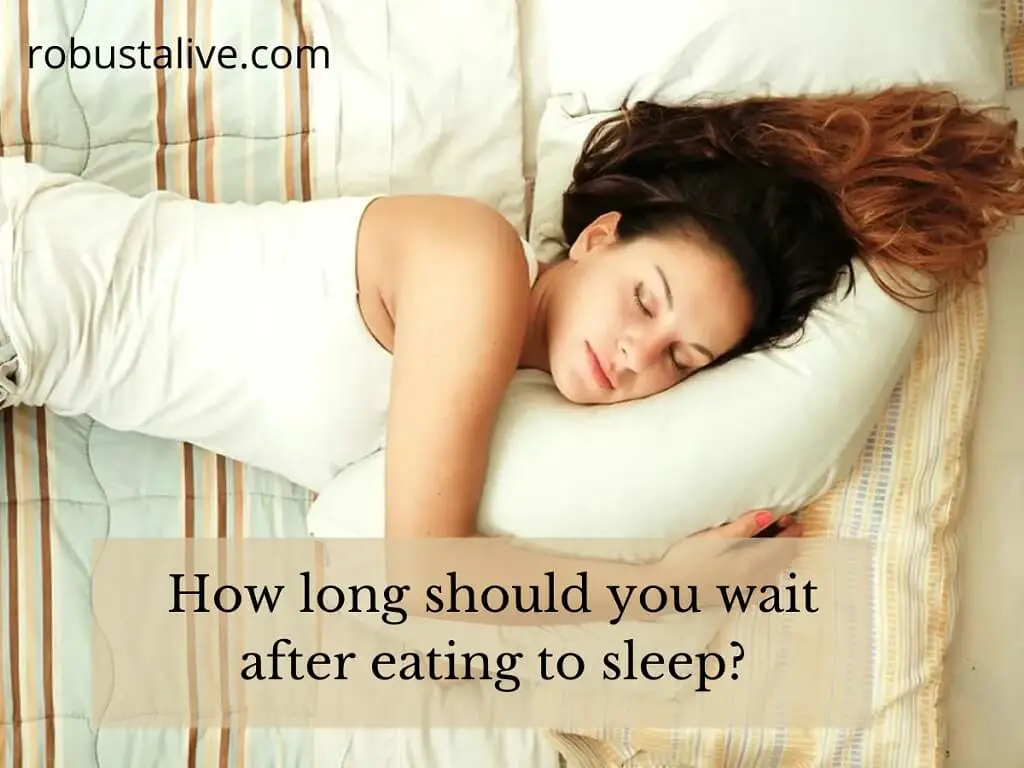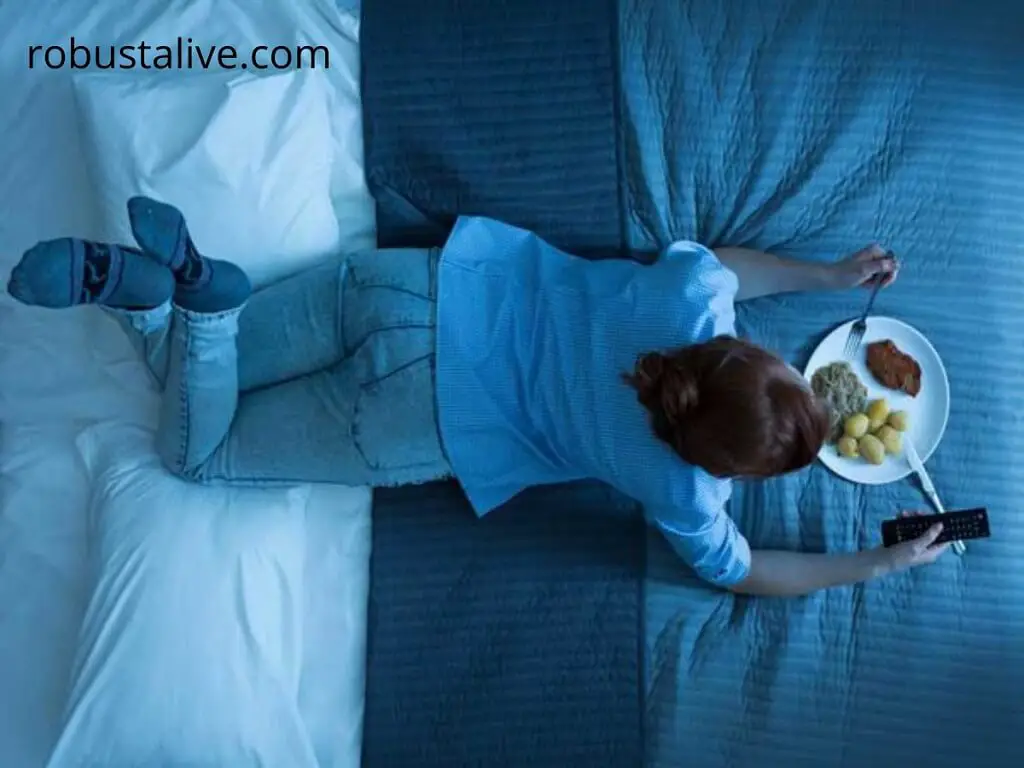How Long Should You Wait to Go to Bed After Eating?

How long should one wait after eating before sleeping in bed? There isn’t a one-size-fits-all response, like most sleep-related queries. It varies based on food consumed and any unique health or sleep issues present. What you should know is as follows. In this article, you can learn about How long should you wait to go to bed after eating?
The general rule of thumb
Although every person is unique, the best practice is to avoid eating a substantial meal three hours before bedtime to stimulate your digestive system to absorb the meal, raise your blood sugar levels, or cause bloating or indigestion.
How long to wait before bedtime?
The best way for your body to digest food is upright since it makes for simple digestion. After a light dinner, lying down right away can result in heartburn and GERD symptoms as the stomach food can reflux into the esophagus. If your stomach has not empty by the time you go to bed, this is more likely to occur.
After dinner, it is typically advisable to wait two to three hours before bed. It decreases the possibility of numerous digestive problem symptoms by giving your body enough time for digestion and for the contents of your stomach to migrate into the small intestine.
Additionally, waiting a few hours after your last meal before lying in bed will lessen your risk of developing sleep difficulties and gaining weight.
What’s the link between food and sleep?
Certain foods, such as turkey, fatty fish, almonds, etc., can improve the quality of your sleep. These are rich in tryptophan, which your body metabolizes into the neurotransmitters melatonin and serotonin. This two help with sleep.
Many people indulge in bad snacks like chips, doughnuts, cookies, and aerated drinks late at night. Snacking at odd hours is a surefire method to consume more calories and put on weight. Before going to bed, you shouldn’t indulge in unhealthy snacks because they will affect you in numerous ways.
Foods to Avoid Before Going to Bed

Photo Credit: robustalive.com
Adenosine, a substance that aids typically in bedtime, can be blocked by some foods when consumed just before night. Additionally, be careful to stay away from foods that cause insomnia. These consist of:
• Alcohol
Many persons with sleep problems or insomnia believe that a couple of glasses of wine or whiskey will help them nod off more quickly. However, for the following reasons, specialists advised against doing this ritual.
Alcohol disrupts the nighttime natural sleep cycle, decreasing the amount of restorative REM sleep.
Alcohol causes muscles to relax. Obstructive sleep apnea and snoring can result from this.
Alcohol affects how the esophageal sphincter muscle contracts, resulting in acid reflux.
• Sweet Treats
Before going to bed or having dinner, you shouldn’t consume sugary beverages, desserts, sweets, or cereal.
It would also help if you refrained from eating sugary foods right before bed. It is because your body depletes micronutrients like magnesium to integrate sugar into the body. Magnesium aids with sleep, so if you don’t get enough of it, sugary foods may keep you up at night. The caffeine in chocolate, on the other hand, stimulates brain activity and keeps you from going asleep.
• Hot Foods
Before going to bedtime, spicy foods should be avoided. Eat peppers or chilies if you like them for breakfast, lunch, or an after-dinner snack.
• Heavy foods
Dinner or even late-night snacking should not involve greasy, cheesy, or meat-based foods that take a lot to digest. Stay with clean, lightly-cooked food.
• Acidic Foods
Acid reflux is a condition that results from acidic foods that can make it challenging to get a good night’s sleep. Avoid eating tomatoes, onions, and citrus fruits or their juices.
Foods with High Water Content
Avoid eating watermelon, cucumber, celery, etc., that contain a lot of water. Sleep quality will be hampered if you have to get up to use the restroom regularly. In a similar vein, avoid consuming too much water right before bed.
• Caffeine
In addition to coffee, many soft drinks and chocolates include caffeine. Caffeine is a stimulant, keeping you awake for longer hours if you use it before bedtime. When eating foods containing caffeine and getting ready for sleep, you should keep a gap of 5 to 6 hours.
Besides, it would help if you refrained from eating hot food before bed. Your body temperature may increase, as a result, keeping you awake longer. Usually, your body lowers its internal temperature. At the same time, you sleep, but if the spicy food keeps your body temperature higher than usual, your brain may receive signals indicating this isn’t the best time to go to sleep.
In addition, eating spicy food frequently might result in indigestion and acidity, which can be yet another factor that interferes with getting a decent night’s sleep.
Also read: Does almond milk cause constipation?
How Much Food Can You Eat?
Even so, certain food groups can make you sleepy. As a result, the quantity of food is essential. Those who eat larger meals have more pronounced food coma and subsequent sleepiness.
A heavy lunch or afternoon meal will undoubtedly leave you eating sleepy and exhausted.
How does a meal affect the sleeping pattern?
Following a meal with sleep can have some adverse effects on your health. It can lead to digestion issues, stomach ailments, interruptions in sleep, and even weight gain.
Does late night bite affect the digestive system and digestion?
A late-night snack or meal can harm your body in irreparable ways.
Once you’ve finished eating, you need to give your food some time to digest. Additionally, you must keep an upright posture for effective stomach food digestion. Therefore, acid reflux is possible if you lay flat after a large meal.
A very painful ailment is acid reflux. When stomach contents spill back into your esophagus, this occurs. It causes unpleasant sensations and affects sleep as a result. Heartburn is the outcome as a result.
Can Sleeping Right After Eating Make You Gain Weight?
Neither weight gain nor reduction is a result of sleep. But excessive weight gain may occur if you sleep right after eating. Without a doubt, this rise is due to calorie intake.
Our metabolism slows down as we sleep. As a result, we cannot burn calories. The result is that the body accumulates stubborn fat.
Conclusion
Death is eternal, and life is finite. As a result, we have a right to a healthy existence. You may maintain healthy food by eating well and getting enough sleep. Undoubtedly, eating well helps with sleep.
Healthy eating and sleeping habits do indeed go hand in hand. However, when a person chooses to eat deliberately but avoids sounds associated with digestion, they are more prone to sleep disorders and digestive issues.
You should be aware of good eating, active lives, and health difficulties, in addition to how long you should wait after eating before going to bed.
Eat better, sleep better, and live better.
Frequently Asked Questions (FAQs) How long should you wait to go to bed after eating?
How long should I wait after eating to sleep?
The science is crystal clear you should aim to eat 2-3 hours before going to bed when it comes to your last meal of the day. It’s challenging to fall asleep and stay asleep if your digestion starts to work just as your body prepares to put all of its systems into “rest mode” for the night.
For how many hours should I wait after eating before going to sleep?
You should generally wait two to three hours after eating before going to sleep.
Can I sleep 1 hour after eating?
Sleeping an hour after eating prevents your body from having time to process the food, leading to digestive issues, including acid reflux and heartburn. After eating, it is advised to wait at least 2-3 hours before bed.
How can I stop drowsiness after eating?
The afternoon energy slump, a typical fluctuation of your circadian cycle that affects everyone, is primarily to blame for making you feel fatigued after eating lunch. Nevertheless, there are two things you can do to reduce the tiredness that follows a meal: reduce your sleep debt and stay away from highly processed, carb-heavy foods.
After eating, is it unhealthy to sleep?
Yes, going to bed right after eating is bad for you. Your body is unable to digest the calories as a result. Thus, the buildup of calories in the body might result in various health issues.
Is eating two hours before going to bed terrible?
Light snacks or low-calorie foods are not a bad idea for bedtime supper. However, avoid eating anything with a lot of protein and carbohydrates two hours before bedtime.
References
https://www.leesa.com/article/eating-before-bed-pros-and-cons
https://www.independent.co.uk/life-style/health-and-families/dinner-sleep-bed-gap-time-meal-eat-two-hours-blood-glucose-levels-health-study-a8740016.html
https://www.her.ie/health/scientific-study-says-can-eat-go-bed-straight-446492
https://www.sleepadvisor.org/eat-just-before-bed-risks/
https://www.verywellhealth.com/eating-before-bed-3014981
https://www.risescience.com/blog/sleeping-after-eating
https://www.getproper.com/blog/how-long-wait-to-sleep-after-eating





